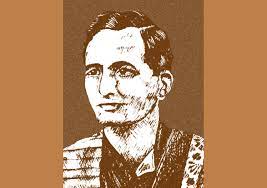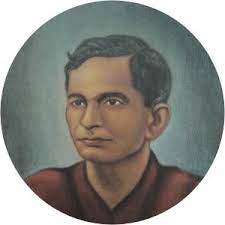Kantakabi Laxmikanta Mohapatra also known as the Kantakabi in the world of Odia literature, was a prominent poet and writer from Odisha, India. Born on 13th July 1851 in a small village called Kuent in the Balangir district of Odisha, Laxmikanta Mohapatra was a Brahmin by caste. His father, Ramchandra Mohapatra , was a learned Brahmin who provided his son with a solid grounding in Sanskrit and other classical languages.
From a young age, Laxmikanta Mohapatra showed a keen interest in literature and poetry. He was greatly influenced by the works of Kalidasa, Valmiki, and other classical poets. His father recognized his talents and encouraged him to pursue his passion for writing. Laxmikanta Mohapatra early education was conducted in his village under the guidance of local Pandits, where he mastered the intricacies of Sanskrit grammar and literature.
After completing his primary education, Laxmikanta Mohapatra moved to Cuttack, the cultural capital of Odisha, to pursue higher studies. He enrolled in a local college and started studying under renowned scholars of the time. He delved deep into the works of Odia poets like Madhusudan Rao, Radhanath Ray, and others, which shaped his own poetic sensibilities.

You can read our another post on Twin Temple of Gandharadi: A Marvel of Ancient Architecture
It was during his college days that Laxmikanta Mohapatra started writing poetry, and soon he gained recognition for his lyrical talent and command over language. His verses were characterized by their simplicity, elegance, and emotional depth. His poems often reflected the social realities of his time, highlighting the struggles of the common man, the beauty of nature, and the glory of Odisha’s culture and heritage.
In 1875, Laxmikanta Mohapatra published his first collection of poems titled “Bijali” (Thunderbolt), which garnered critical acclaim and established him as a rising star in the world of Odia literature. The collection contained poems on a wide range of subjects, from love and longing to patriotism and social justice. His use of vivid imagery, rich metaphors, and rhythmic language captivated readers and critics alike.
Over the next few years, Laxmikanta Mohapatra continued to write and publish poems, further cementing his reputation as a leading poet of his generation. His poems were widely circulated in literary circles, and he soon acquired a devoted following of admirers. He was hailed as the Kantakabi (thorn poet) for his fiercely independent spirit and his fearless critique of societal norms and injustices.
Apart from poetry, Laxmikanta Mohapatra also wrote essays, short stories, and plays that reflected his diverse talents and interests. His prose works exhibited a keen intellect, a sharp wit, and a profound understanding of human nature. He was a keen observer of society and politics, and his writings often carried a strong social message.

In addition to his literary pursuits, Laxmikanta Mishra was also actively involved in the cultural and political life of Odisha. He participated in various social reform movements, advocating for the rights of the marginalized and oppressed sections of society. He was a vocal critic of colonial rule and an ardent supporter of India’s independence movement.
Laxmikanta Mohapatra poetry played a significant role in shaping the cultural and literary landscape of Odisha during the late 19th and early 20th centuries. His works inspired a new generation of poets and writers to explore new themes and experiment with new forms of expression. He was a pioneer in bringing about a renaissance in Odia literature and establishing its credibility on the national stage.
In recognition of his contributions to Odia literature, Laxmikanta Mohapatra was conferred with several prestigious awards and honors. He was felicitated by the Odisha Sahitya Akademi and other literary bodies for his outstanding literary achievements. His poems were included in school textbooks and anthologies, ensuring that his legacy would endure for generations to come.
Despite his fame and success, Laxmikanta Mohapatra remained a humble and down-to-earth individual, devoted to his craft and his vision of a just and humane society. He continued to write and publish poems until his last days, never compromising on his principles or his artistic integrity. His poems continue to resonate with readers for their timeless themes, universal appeal, and enduring relevance.
On 10th October 1925, Laxmikanta Mohapatra passed away, leaving behind a rich legacy of poetry and prose that continues to inspire and captivate readers to this day. He is remembered as a true visionary, a fearless crusader for social justice, and a masterful poet whose words continue to echo in the hearts of his readers. Kantakabi Laxmikanta Mohapatramay have left this world, but his spirit lives on through his immortal verses, which continue to touch the souls of all who encounter them.
FAQ For Kantakabi Laxmikanta Mohapatra Biography
Who was Kantakabi Laxmikanta Mohapatra?
Kantakabi Laxmikanta Mohapatra was a prominent poet and writer from Odisha, India. He is known for his contributions to Odia literature and is considered one of the greatest poets in the language.
What are some of his notable works?
Some of Kantakabi Laxmikanta Mohapatra’s most famous works include “Janana,” “Chilika,” and “Usha.” He also wrote numerous poems, essays, and plays that have had a significant impact on Odia literature.
When was Kantakabi Laxmikanta Mohapatra born and when did he pass away?
Kantakabi Laxmikanta Mohapatra was born on April 19, 1890, in Odisha, India. He passed away on March 29, 1957, leaving behind a lasting legacy in the world of literature.
What themes did Kantakabi Laxmikanta Mohapatra explore in his writings?
Kantakabi Laxmikanta Mohapatra’s works often reflect themes of love, nature, patriotism, and social issues. He was known for his lyrical poetry that captured the beauty of Odisha’s landscapes and the struggles of its people.
How has Kantakabi Laxmikanta Mohapatra influenced Odia literature?
Kantakabi Laxmikanta Mohapatra is considered a pioneer of modern Odia literature and has had a lasting impact on the language. His poetic style, depth of emotion, and social consciousness have inspired generations of writers and poets in Odisha and beyond.
